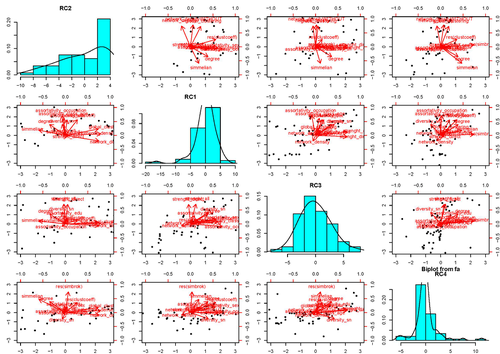
ROCHET Paul
Recommendations: 0
Review: 1
Review: 1

The Complexity of Social Networks in Healthy Aging: Novel Metrics and Their Associations with Psychological Well-Being
An application of PCA to social networks and healthy ageing
Recommended by Steve Lawford based on reviews by Christophe Prieur, Paul Rochet and 1 anonymous reviewerSueur et al. (2024) investigate the influence of an individual’s social network structure on various aspects of healthy ageing, including depressive symptoms, life satisfaction, and overall well-being. The primary dataset comprises 73 adults aged 60 and above, residing in the Paris region from 2019 to 2020, who completed a VERITAS socioeconomic/demographic questionnaire; and is augmented with official data on the characteristics of residential neighbourhoods. The authors apply principal component analysis (PCA) to network structure metrics including degree centrality, density, and global clustering, and identify four dimensions that they argue have social significance: homophily, social integration, social support, and perceived accessibility to local services. Unexpectedly, the authors’ statistical analysis reveals that none of the PCA dimensions are linked to healthy ageing.
Although network-based PCA dimensions have been used as explanatory variables in other settings, this paper may be the first to apply the technique to healthy ageing. The main result stands in contrast to related literature which indicates that positive social relationships (engagement, sense of community) are related to more favourable mortality and disease outcomes and that these effects persist as people become older. The paper is a useful contribution to an issue that has considerable public health policy importance. It will motivate further research to understand the negative main result, including potential information loss from PCA, issues of small sample bias and identification (relatively few of the respondents were depressed or anxious), specificity of the survey to the Paris region, and more advanced econometric modelling to better understand causal relationships (rather than correlations) between social networks and well-being in older people.
Reference
C. Sueur, G. Fancello, A. Naud, Y. Kestens, and B. Chaix (2024) The complexity of social
networks in healthy aging: novel metrics and their associations with psychological wellbeing. OSF Preprints, ver. 3 peer-reviewed and recommended by Peer Community in Network Science.
https://doi.org/10.31219/osf.io/j9uz8